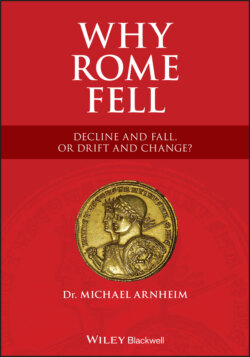Читать книгу Why Rome Fell - Michael Arnheim - Страница 61
Julian on Augustus and Diocletian
ОглавлениеIn Julian’s satirical sketch, De Caesaribus (“The Caesars”), penned in December 361, the Emperor Julian (r. 361–363), Constantine’s nephew, draws a marked contrast between Augustus and Diocletian. Here, first, is his portrait of Augustus, whom he calls Octavian, presumably because “Augustus” would have been confusing because it was a standard title borne by emperors from the time of the original Augustus down to his own day and by Julian himself:
Octavian entered, changing color continually, like a chameleon, turning now pale, now red; one moment his expression was gloomy, sombre, and overcast, the next he unbent and showed all the charms of Aphrodite and the Graces. Moreover, in the glances of his eyes, he was fain to resemble mighty Helios, for he preferred that none who approached should be able to meet his gaze. “Good Heavens!” exclaimed Silenus, “what a changeable monster is this! What mischief will he do us?” “Cease trifling,” said Apollo, “after I have handed him over to Zeno here, I shall transform him for you straightaway to gold without alloy. Come, Zeno,” he cried, “take charge of my nursling.” Zeno obeyed, and thereupon, by reciting over Octavian a few of his doctrines, in the fashion of those who mutter the incantations of Zamolxis, he made him wise and temperate. (Julian, Caes. 307, tr. Wright (1913) attalus.org/translate/caesars.html.))
After mocking Augustus for his apparently shifting identities as a young man, Julian, a noted philosopher in his own right, concluded by praising him unstintingly as “wise and temperate” through his supposed conversion to Stoicism (Zeno of Citium being the founder of the Stoic school of philosophy.)
Julian’s portrait of Diocletian was rather different, coupling his pomp with the collegiate nature of the tetrarchy that he established:
Next Diocletian advancing in pomp, bringing with him the two Maximians and my grandfather Constantius. These latter held one another by the hand and did not walk alongside of Diocletian, but formed a sort of chorus round him. And when they wished to run before him as a bodyguard, he prevented them since he did not think himself entitled to more privileges than they. But when he realised that he was growing weary, he gave over to them all the burdens that he carried on his shoulders and admired their unanimity and permitted them to sit far in front of many of their predecessors. (Julian, Caes. 315, Ibid.)
